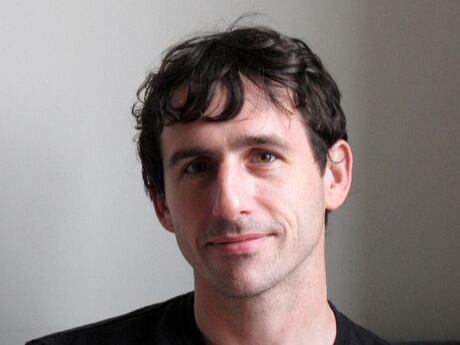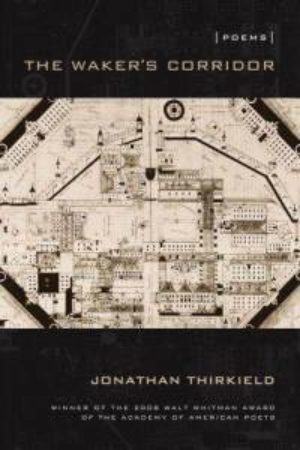New American Poets
New American Poets: Jonathan Thirkield

The Mourners (44:44)
They are music done. Bodies of shale. Heads of eaves.
A husband's rendering in stone. He slept in thieves'
Garments in a visitors house in town burnt by the time
Of day when the west room's window irons striped him.
Three psalter flower tops had broken from the garden
Like children. "You weed like an hysterical woman,"
They said. The ruddy, horizon-filtered sun blotted
The town square as if it were a prone colossus sotted,
Face down and drenched with wine. His elbows sagged,
The steeples cast gray teeth that softened the edges
Between beginnings of brush, a stoppage of commerce
At seven and, crossing the two, the unsteady hearse—
A bridge's unfinished ridges shivering its wheels—
Baring an imperfect death to an unremarkable field.
There weren't enough criers at the time. So some fled
At any unexpected sound. Much of the train dwindled.
A modest flood uphill. When they reached the gallows
Hooded widows wooded the meadow with their shadows,
A statue of an angel strangely strangled angled over
The crossbeam seemed strung up by ivy—acting a lover
Climbing from his bed to twist his arm around the neck
And shoulders of his wife sitting up still and awake:
"The magpie in a Bruegel painting stands there where
A rope should be. Highest living thing not in the air.
Much lower, the peasants in a rondo dance. They dance
In threes, and couples gaze at knotted trees, a trace
Of excrement enlivening their noses. The gossiping
Gardens, sleeves wet from the beer tables, slipping
To my knees. It's a joke, dying. See the children leer
Under wash lines, one thieving an orange, a muscular
Orange, and hiding it down his pants to play a naughty
Resurrection game. Little pairs of girls in Germany
Throw dolls into a mid-Lent stream. Yes, they are all
Returning. All of them, lips wetted and sculptural,
Mouthing an enchanted syntax scripted in Romances.
The corpse minus a head, wasn't who we thought it was.
The wife gone twenty years, only hiding out of spite.
And Ariel, your shipwreck trick, with sweet sprites
Singing, fooled Ferdinand fully. Can you hear them?
The neighbors in a thin packet of light trying themes
On each other. One is your father. Are you listening?
'Pour me' 'What?' 'Some more—my heart is thinning.'
'First Roll. Hah! Hard eights!' 'Did you see a king go
By here?' 'Aches?' 'No, sorry.' 'Didn't think so.'"
Reprinted with the permission of the author. All rights reserved.
Introduction to the work of Jonathan Thirkield
Arda Collins
A voice circumambulating a pattern breaks the pattern apart and opens into sentience. The poems in The Waker's Corridor have the type of formal complexity that makes a mosaic appear to be moving; for twilight in the city to feel musical—"the sky a crowd"; or the stars in the night sky to appear still as they speed through the cosmos. The "ministry of interstices" is the space made by the re-invention of what is audible, "a bare foot" that "taps the tiles to music/unheard from where you stand." These poems create atmosphere from water; flowers; marble; concrete; night; dreaming; theater; and bring noiseless gestures into speech.
The personages we encounter are spirit, shade, flesh, statue, memory: "And in the rooms we rise again for water,/or to get the ringing phones, or to check/on a child resting by a dormant radiator/in a narrow bed." No one is alive, or no one is more alive than anyone else, not Hamlet nor his father, Lear's Edgar, or Miranda in a new world. "You can see a figure walk/from time to time, today or twenty years ago… He knows the game: who filters/Out life the longest wins," and so personhood, in the directly human sense, is suspended: "The flesh on its scaffold holds/your hands, your voice, your instrument, your body." An atmosphere of a city, and the memory of it are resurrected in its own light.
The city is partial; it casts a vivid shadow of our world, though the grief and consequences that occur in it are corporeal, are real: "A child too off-white/to lie beneath the sun in Belarus/plays Tetris by a row of green umbrellas./His father thumbs Ecrits by Jacques Lacan,/and tunes the radio to Chaka Khan./I feel for you."
A poem is an interlude, a prelude, an elegy, a nocturne, a tiny play, a pantomime, "a gondolier/plays the scattered pieces of his fiddle-form/in broken light." In a precisely fractured speaking part, "A perfect scene, a voice unwarrantedly" bears out. Just as there isn't justification for the events of the world, their urgency is plain, and beauty is methodical: "Cold planets counting for a few near holy/patterns somewhere above the interfering/Lamplight. Or look to them, in constellations/lit across windows. The imagination/falters at the numbers alive in their rooms."
Statement
Jonathan Thirkield
I approach poetry as a control system, one whose function is to contain packets of experience or experienceable units that are expressed through act of reading. My objective when writing a poem is to achieve a kind of stability for its various threads of sound and meaning by deliberately framing them within a hard set of constrictions or measures. The measures can be arbitrary, metrical, personal, historical, visual—anything that begins to set limits on the language, and creates a pathway through which the words can move.
Part of the appeal I find in limits, forms and measures is the play involved. I think of how a child uses play to understand reality through various semi-arbitrary actions, testing out different versions and possibilities of the world. I see poetry as a continuation of that instinct: it tests our comprehension of the world by constantly offering new models for it. I often find that the experience of reading a new, particularly difficult poem, reduces me to a child-like state of consciousness. I don't immediately know where I am, and I have to navigate the language in new ways so that I can begin to see the author's world. It challenges me to adjust or redraw my mind so that I can enter that specific poetic space.
It's tempting to compare this experience to that of playing a video game: in which you are placed in a new, strange environment and are then forced to decipher its rules through trial and error. In a video game, however, you merely play through a number of preset possibilities. You are limited by the platform and the processing speed, and by a fixed visual field. In a poem, language itself is the platform and the reader's mind is the processor. The two act upon each other, building and unbuilding experience so that you might never play out the possibilities. For instance, when does one ever finish reading "The Windhover" or Harmonium?
There is, of course, a less playful side to limits and forms, in that they become enactments of control. Measures do limit possibilities—sometimes in the extreme. In The Waker's Corridor I was particularly interested in subjecting myself to heavy doses of control: often limiting line-length to an exact number of characters or obediently following the prescriptions of iambic pentameter. In this way, I hoped to explore the necessity of limitations: our need to be controlled, to be kept from our impulses, to be ordered by an exterior force—something that feels solid, concrete, numerical. Especially when faced with disarray, mental rupture, or loss, the mind clings to stability, even the illusion of it. But no matter how elaborate its controls, poetry doesn't function to appease our desires for safety and permanence. Instead, it finds new ways of holding disorder and reconstituting loss. It shifts along with the mind and with time: always allowing for a different, future self to emerge, and the possibility of world in which that self can exist.



